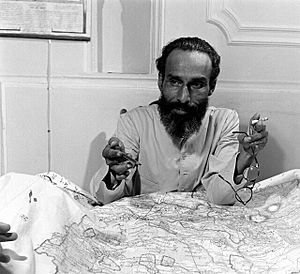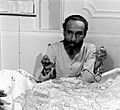Kasim Razvi facts for kids
Quick facts for kids
Syed Muhammad Qasim Razvi
|
|
|---|---|

Razvi during Operation Polo
|
|
| Born | 17 July 1902 Lucknow, United Provinces Later settled in Latur, Hyderabad state
|
| Died | 15 January 1970 (aged 67) |
| Resting place | Azam Ganj, Latur |
| Alma mater | Aligarh Muslim University |
| Occupation | Lawyer, politician |
| Children | 10 (5 sons & 5 daughters) (Sarwar Sultana, Syed Ahmed Kazim Razvi, Syed Ahmed Asif Razvi, Syed Ahmed Arif Razvi, Zakia, Fouzia, Razia, Tayyaba, Syed Ahmed Nasir Razvi, Syed Ahmed Farooq Razvi) |
| Parent(s) | Syed Ahmad Khan Razvi |
Syed Kasim Razvi (also known as Qasim Razvi; born July 17, 1902 – died January 15, 1970) was an important politician in the old princely state of Hyderabad. He led the Majlis-e-Ittehadul Muslimeen party from December 1946 until Hyderabad joined India in 1948. He also started a group called the Razakar militia in the state. He had a lot of power with the Nizam of Hyderabad, which made it difficult for Hyderabad to join India.
Some historians believe that Razvi's ideas and actions were very harmful to Hyderabad during the important years of 1947–48.
Early Life and Career
Kasim Razvi was born in the United Provinces of India. He studied law at the Aligarh Muslim University. After finishing his studies, he moved to Hyderabad state. He worked briefly in Hyderabad city before becoming a lawyer in Latur, a town in the Osmanabad district. He had family connections there through his father-in-law.
According to Mohammad Hyder, a former government official, Latur was a place where rules were not always strictly followed. Razvi became quite wealthy there. After joining the Majlis-e-Ittehadul Muslimeen (called Ittehad), Razvi reportedly gave all his money to the party. This made him famous and earned him the title Siddique-e-Deccan, which means "Truthful One of the Deccan."
After the first leader, Nawab Bahadur Yar Jung, passed away in 1944, the Ittehad party became very extreme and divided. Razvi tried to stand out by suggesting political changes, even if the party members didn't like them. He then started his own group in Latur, called Majlis-e-Islah Nazm-o-Nasq. This group was meant to bring about reforms, but it also helped him gain his own followers outside the main party.
In February 1946, some extreme members of the party caused a strong protest. This led to the resignation of the Ittehad leader. In the election for the new president, Kasim Razvi won against another extreme leader named Abdur Rahman Rais. Razvi's views were also very extreme. From this point on, Razvi became a very powerful figure in Hyderabad politics.
Personal Life
Kasim Razvi had 10 children, five sons and five daughters. One of his granddaughters, Atiya Khan, is a filmmaker in Pakistan. She is the daughter of Fouzia Ejaz, one of Razvi's daughters. His grandson, Yawar Aziz, is also a well-known person in the Islamic community in North America.
Leadership of the Ittehad
The Razakars were a group of Muslims who wanted Hyderabad to remain independent or join Pakistan. Since joining Pakistan was not possible because Hyderabad was too far away, Razvi encouraged the Nizam to take a strong stand. He told the Razakars to fight against Hyderabad joining the new government of India. Razvi even went to Delhi and had a difficult meeting with Indian leader Sardar Vallabhbhai Patel. He is famously quoted saying, "Death with the sword in hand, is always preferable to extinction by a mere stroke of the pen." This quote meant he preferred to fight rather than give up easily.
After Operation Polo, which was when the Indian Army defeated the Razakars and Hyderabad joined India, Razvi was put under house arrest. He was tried for his actions and for causing trouble. He was in jail from 1948 to 1957. He was released from prison only after he promised to move to Pakistan within two days. He agreed to this condition and moved to Pakistan, where he passed away in 1970. His family had already been living there since 1949.
According to Mir Laiq Ali, who was the Prime Minister of Hyderabad state, many people who were not good citizens joined the Razakars. He sadly stated that as the group grew, Kasim Razvi could no longer control them.
Images for kids
 | Shirley Ann Jackson |
 | Garett Morgan |
 | J. Ernest Wilkins Jr. |
 | Elijah McCoy |


